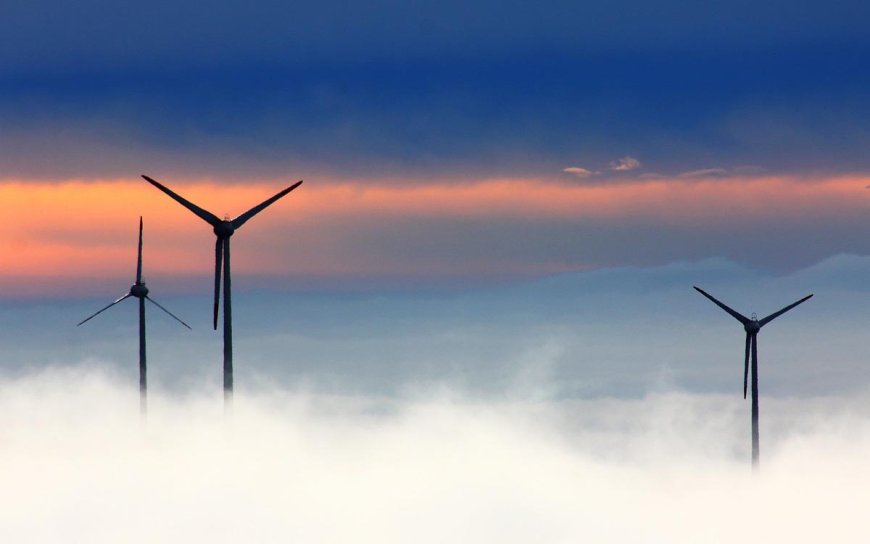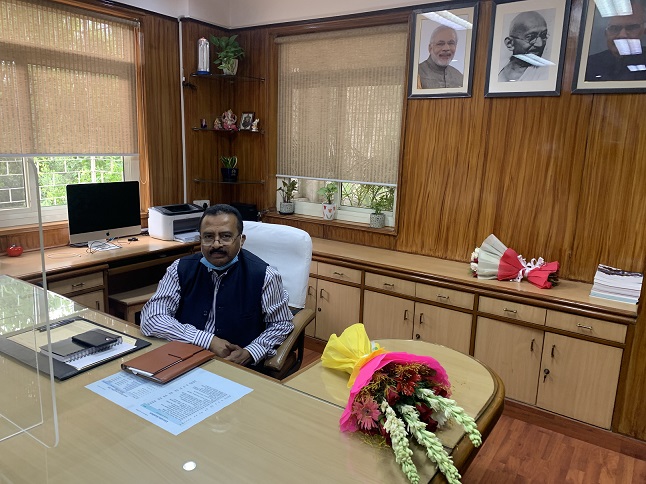India's Renewable Energy Push: Achievements, Challenges, and Future Plans
As the world grapples with the urgent need to transition towards sustainable energy sources, India has emerged as a shining example of commitment and innovation in renewable energy. With its ambitious goals and steadfast initiatives, this vibrant nation is making significant strides towards a cleaner and greener future.

Introduction to India's renewable energy goals and initiatives
As the world grapples with the urgent need to transition towards sustainable energy sources, India has emerged as a shining example of commitment and innovation in renewable energy. With its ambitious goals and steadfast initiatives, this vibrant nation is making significant strides towards a cleaner and greener future.
From harnessing solar power to tapping into wind resources, India's renewable energy journey has been nothing short of remarkable. In this blog post, we will delve into the achievements that have positioned India as a global leader in clean energy solutions. We will also explore the challenges faced by the country in implementing these projects and discuss its future plans for further growth. Additionally, we'll examine how India's push for renewable energy aligns with global sustainability efforts.
Join us on this captivating ride through India's extraordinary efforts to revolutionize its energy landscape!
Current achievements in the renewable energy sector
India has made significant strides in the renewable energy sector, positioning itself as a global leader in clean energy production. One of its notable achievements is the rapid growth of solar power installations. With an ambitious target to reach 100 GW of solar capacity by 2022, India has already achieved more than triple its initial goal and currently stands at around 35 GW.
Another remarkable achievement is the expansion of wind power generation. India boasts a cumulative installed capacity of over 38 GW, making it one of the top countries globally for wind energy production. The government's efforts to promote wind farms and provide incentives have played a crucial role in this success.
Additionally, India has actively promoted hydroelectric power projects, harnessing the immense potential offered by its rivers and water resources. The country now has an installed hydropower capacity exceeding 50 GW, contributing significantly to its renewable energy mix.
Moreover, there have been significant advancements in biomass-based power generation and small-scale decentralized renewable energy systems such as microgrids and off-grid solar solutions. These initiatives have improved access to electricity for remote rural areas while reducing dependence on traditional fossil fuel sources.
Furthermore, India's commitment to promoting electric mobility cannot be overlooked. The government aims for electric vehicles (EVs) to comprise 30% of total vehicle sales by 2030. To support this transition, various policies like tax incentives and subsidies are being implemented alongside investments in charging infrastructure development.
These achievements highlight India's dedication towards building a sustainable future powered by renewable energies across various sectors including solar power, wind energy, hydroelectricity, biomass-based systems, and electric mobility. By leveraging these accomplishments as stepping stones for further progress,a cleaner and greener future seems within reach not just for India but also inspiring other nations worldwide!
Challenges faced by India in implementing renewable energy projects
One of the key challenges faced by India in implementing renewable energy projects is the issue of land acquisition. The availability of suitable land for setting up solar and wind power plants can be limited, especially in densely populated areas. This poses a significant hurdle as large-scale renewable energy projects require vast expanses of land.
Another challenge lies in securing financing for these projects. While the cost of renewable energy technologies has been steadily decreasing over the years, initial investment remains high. Access to low-cost and long-term funding options is crucial to attract investments and accelerate the deployment of clean energy infrastructure across the country.
Grid integration also presents a challenge. As more renewable energy sources come online, ensuring seamless integration with existing electricity grids becomes essential. Upgrading and expanding transmission infrastructure is necessary to accommodate increased capacity and enable smooth transfer of power from renewable sources to consumers.
Additionally, policy and regulatory frameworks need continuous refinement to support renewable energy growth effectively. Streamlining procedures for obtaining permits, addressing bureaucratic delays, and providing incentives for private sector participation are vital aspects that require attention.
Furthermore, intermittency issues associated with certain renewables like solar and wind pose challenges related to resource variability. Developing storage solutions or alternative methods such as grid balancing techniques can help mitigate this challenge.
In conclusion, India's journey towards achieving its ambitious targets in the renewable energy sector comes with its fair share of challenges. However, it is important to address these hurdles strategically through effective policies, technological innovations, and collaborations between government bodies and private stakeholders.
By overcoming these obstacles, India can continue on its path towards a sustainable future powered by clean energies!
Future plans and targets for renewable energy growth
India has set ambitious goals for the expansion of its renewable energy sector. The government aims to achieve a total capacity of 450 GW of renewable energy by 2030, which includes 280 GW from solar power, 140 GW from wind power, and the remaining from bioenergy and small hydro projects. These targets demonstrate India's commitment to reducing its dependence on fossil fuels and transitioning towards a greener future.
To meet these objectives, several initiatives have been launched. The government has introduced various policies and financial incentives to attract investment in renewable energy projects. It is also focusing on promoting research and development in areas such as advanced solar technologies, battery storage systems, and smart grids.
Furthermore, efforts are being made to enhance grid infrastructure to accommodate the integration of higher shares of renewables into the electricity system. This involves strengthening transmission networks and implementing measures for better demand forecasting and management.
In addition to expanding capacity, India is working towards improving efficiency in the renewable energy sector through technological advancements and innovative solutions. This includes exploring options like floating solar farms on water bodies, rooftop solar installations in urban areas, hybrid projects combining multiple sources of clean energy generation, among others.
The target set by India not only contributes significantly towards achieving global climate goals but also brings immense economic opportunities. The growth potential in the renewable energy market can attract investments both domestically as well as internationally while creating jobs across various sectors.
However, there are challenges that need to be addressed along this path towards sustainable growth.
Impact of the pandemic on India's renewable energy sector
The COVID-19 pandemic has undoubtedly had a significant impact on various sectors, including India's renewable energy sector. As the nation grappled with lockdowns and economic uncertainties, the development of renewable energy projects faced several challenges.
Supply chain disruptions caused by global restrictions hindered the procurement of crucial components for renewable energy systems. Manufacturing delays and shortages of solar panels, wind turbines, and batteries created obstacles in project implementation.
Construction activities were halted due to labor shortages and social distancing measures. This led to project delays as workers were unable to be present at construction sites or travel between locations freely.
Furthermore, financing became a major concern during this time. With financial markets experiencing volatility and investors becoming cautious about funding new projects, many developers struggled to secure necessary capital for their ventures.
Despite these setbacks, it is important to note that the pandemic also presented opportunities for growth in India's renewable energy sector. The nationwide lockdown resulted in a drastic reduction in industrial activity and transportation emissions. This provided a glimpse into how cleaner air quality can be achieved through reduced reliance on fossil fuels.
Additionally, there was an increased focus on distributed generation models such as rooftop solar installations during the pandemic. This decentralization approach ensured greater resilience against grid disruptions while promoting local job creation opportunities.
As we look ahead towards recovery from the pandemic's impact on our economy, it is crucial for India's government and industry stakeholders to continue prioritizing investments in renewable energy infrastructure. By leveraging innovative technologies like advanced storage solutions and digital platforms for efficient grid management, we can accelerate our transition towards a sustainable future.
In conclusion, the long-term potential of India's renewable energy sector remains strong despite temporary setbacks caused by the pandemic. As one of the world's largest consumers of energy with immense natural resources like solar power potential across its vast landscape -India has both an opportunity and responsibility to lead by example in driving clean energy adoption globally.
How India's push for renewable energy is contributing to global efforts towards sustainability
India's push for renewable energy is not just significant on a national level but also has far-reaching implications for global sustainability efforts. By aggressively promoting and investing in renewable energy sources, India is setting an example for countries around the world to reduce their reliance on fossil fuels and transition towards clean energy alternatives.
One of the key ways that India's renewable energy push contributes to global sustainability is by reducing carbon emissions. As one of the largest emitters of greenhouse gases, India's commitment to ramping up its use of solar, wind, hydro, and bioenergy helps combat climate change by curbing CO2 emissions. This shift towards cleaner energy sources aligns with the goals set by international agreements such as the Paris Agreement.
Moreover, India's efforts to expand its renewable energy capacity have a ripple effect globally. The country has become one of the biggest markets for renewable technology investments, attracting both domestic and foreign players. This influx of capital leads to advancements in research and development in areas like solar panel efficiency or battery storage technology which can benefit other nations looking to adopt similar sustainable practices.
Additionally, India's push for renewable energy fosters innovation within its own borders. It encourages startups and entrepreneurs to develop innovative solutions that can be replicated worldwide. These innovations range from affordable solar-powered appliances for rural communities to smart grid technologies that optimize electricity distribution.
Furthermore, India actively participates in international collaborations aimed at promoting sustainable development through clean energy initiatives. The country engages in partnerships with other nations and organizations to share knowledge about best practices, policies, investment opportunities, and technological advancements in renewables.
India's commitment towards expanding its renewable energy sector offers inspiration and motivation for countries globally striving towards a more sustainable future. By leading this charge through ambitious targets and concrete actions on multiple fronts including policy support frameworks, financial incentives schemes or infrastructure development plans - India proves it is possible to achieve a green transformation while simultaneously fostering economic growth.
Conclusion: The potential of India's renewable energy sector and its role in shaping the future of clean energy worldwide
The potential of India's renewable energy sector is undoubtedly vast, and its role in shaping the future of clean energy worldwide cannot be overstated. With its ambitious goals, impressive achievements, and resilient efforts to overcome challenges, India has emerged as a global leader in renewable energy.
Through initiatives like the Jawaharlal Nehru National Solar Mission and the Wind Power Program, India has made significant strides in harnessing solar and wind power. The country's commitment to expanding its renewable energy capacity has resulted in a substantial increase in installations over the years.
However, there are still challenges that need to be addressed for sustained growth. Issues such as land acquisition, grid integration, financing constraints, and policy stability demand continuous attention from policymakers. Resolving these hurdles will unlock even greater opportunities for investment and development in the renewable energy sector.
Looking ahead, India has set ambitious targets for itself under the Paris Agreement – aiming to achieve 40% of its total installed capacity from non-fossil fuel sources by 2030. To reach this goal requires concerted efforts from all stakeholders involved – government bodies, private companies, investors, communities – working together towards a common objective of sustainable development.
The impact of the COVID-19 pandemic on India's renewable energy sector cannot be ignored. It disrupted supply chains and delayed project timelines due to lockdowns and restrictions imposed globally. However ,India remains firmly committed to its green transition despite these setbacks . As economies recover post-pandemic ,the focus on clean energy solutions will only intensify , further driving investments into renewables .
India's push for renewable energy is not just about meeting domestic needs but also contributing to global efforts towards sustainability . By embracing cleaner alternatives at scale ,India showcases how developing countries can play an instrumental role in combating climate change while fostering economic growth . Its experiences ,lessons learned,and technological advancements have become valuable resources for other nations seeking inspiration or guidance on their own renewable journeys .
In conclusion,the potential of India's renewable energy sector is immense. As the country continues to invest in clean energy, it is well-positioned to lead the way in shaping the future of renewable energy worldwide. With determined efforts and collaboration, India can achieve its ambitious goals and inspire others to follow suit, creating a cleaner and greener planet for generations to come.











.jpg)




































